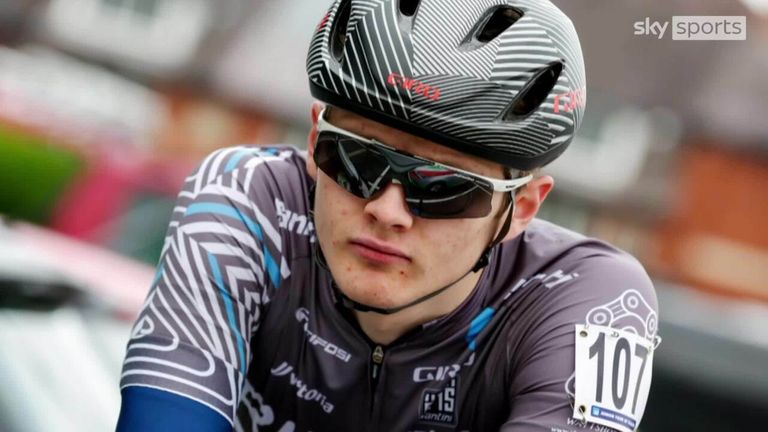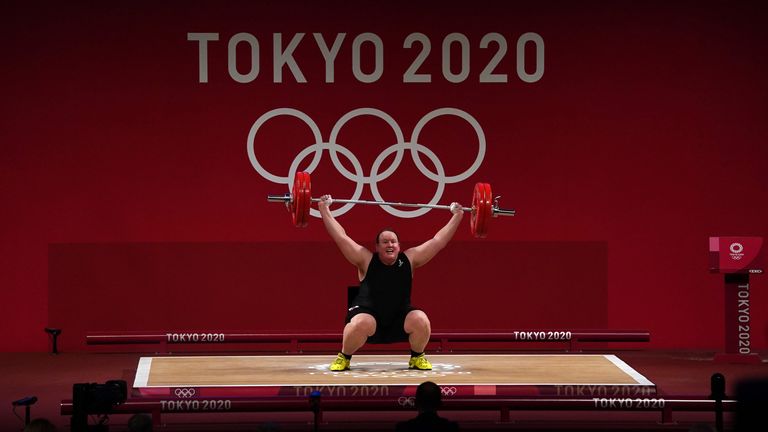Boris Johnson says 'biological males should not be competing in female sporting events'
Transgender cyclist Emily Bridges was last week barred from competing in the British National Omnium Championships by the sport's governing body the UCI; Hastings United Women's goalkeeper Blair Hamilton was called up to represent England's University team
Thursday 7 April 2022 06:05, UK
Boris Johnson has said that "biological males should not be competing in female sporting events".
Speaking to broadcasters on a hospital visit on Wednesday, the Prime Minister said: "I don't think biological males should be competing in female sporting events. Maybe that is a controversial thing to say, but it just seems to me to be sensible."
He continued: "I also happen to think that women should have spaces - whether it is in hospitals or prisons or changing rooms or wherever - which are dedicated to women.
"That doesn't mean that I am not immensely sympathetic to people that want to change gender, to transition and it is vital that we give people the maximum possible love and support in making those decisions."
- Bridges: Coming out as trans is a crucial step on my journey
- Laurel Hubbard: Transgender weightlifter out of Olympic final after failing to register lift
The Prime Minster's comments come after transgender cyclist Emily Bridges was last week barred from competing in the British National Omnium Championships after the sport's governing body ruled she was not eligible.
LGBT+ charity Stonewall warned against "inflammatory rhetoric" and says "blanket exclusions on trans people participating are fundamentally unfair".
Bridges, 21, who had been due to compete in a women's event for the first time, set a national junior men's record over 25 miles in 2018 and began hormone therapy last year to reduce her testosterone levels.
British Cycling's transgender regulations require riders to have had testosterone levels below five nanomoles per litre for a 12-month period prior to competition.
But British Cycling said it was informed by the UCI, cycling's governing body, that Bridges was not eligible to compete under its current guidelines.
"We have been in close discussions with the UCI regarding Emily's participation this weekend and have also engaged closely with Emily and her family regarding her transition and involvement in elite competitions," a British Cycling statement read.
It was also reported this week that Blair Hamilton, who was born male but identifies as female and currently plays for Hastings United Football Club women's team, had been called up to represent the England Universities women's squad.
The 32-year-old, a PhD student at the University of Brighton, who is also lead investigator of the Tavistock Transgender Athlete Study, shared her excitement over her selection on social media. "Buzzing for this though," she said.
Hastings United Women tweeted: "The 'U's are delighted to announce Blair Hamilton has been selected for the England Universities Sport Women's Squad."
Also this week, new guidance from the Equality and Human Rights Commission said that transgender people can be legitimately excluded from single-sex services - but only if the reasons are "justifiable and proportionate".
The government's watchdog said that the justification could be for reasons of privacy, decency, to prevent trauma or to ensure health and safety.
Stonewall insists inclusion policies "need to be considered on a sport-by-sport basis".
"Trans people deserve the same opportunities as everyone else to enjoy the benefits of sport, and blanket exclusions on trans people participating are fundamentally unfair," a Stonewall spokesperson told Sky Sports News.
"This is a complex and fast evolving issue and much of the science doesn't yet exist in this area. Inclusion policies need to be considered on a sport-by-sport basis and it's vital to avoid using inflammatory rhetoric - which often causes trans people to stop playing the sports they love.
"While elite sport often dominates these discussions, it only makes up a tiny proportion of all sport played in the UK. We know that trans people are also under-represented in community sport and often feel excluded.
"Two in five trans people (38 per cent) say they avoid going to the gym or participating in sports groups because they fear of discrimination and harassment. Sport has the unique power to bring us together and it's important that trans people have the opportunity to enjoy the benefits of sport without facing exclusion or abuse."
What are the current rules?
The International Olympic Committee updated it's guidance in November 2021 after the Tokyo Olympics to say that no athlete should be excluded from competition on the grounds of a perceived "unfair and disproportionate advantage" due to their gender.
At the time they were issued, the governing body said it was not in a position to issue regulations that define eligibility criteria for every sport, instead leaving it to individual federations to make the final call.
The IOC said it plans to work with federations on a "case-by-case basis".
The new guidelines were introduced just a few months after the New Zealand weightlifter Laurel Hubbard made history as the first transgender athlete to compete at an Olympics in the games' 125-year history.
At the time, critics argued her participation in the competition to be unfair.
Since then, World Athletics have set their testosterone level benchmark at five nanomoles per litre.
World Rugby has banned trans women from playing at elite level, while the Rugby Football Union's domestic policy in England does allow trans women to play, under certain testosterone-based conditions.




